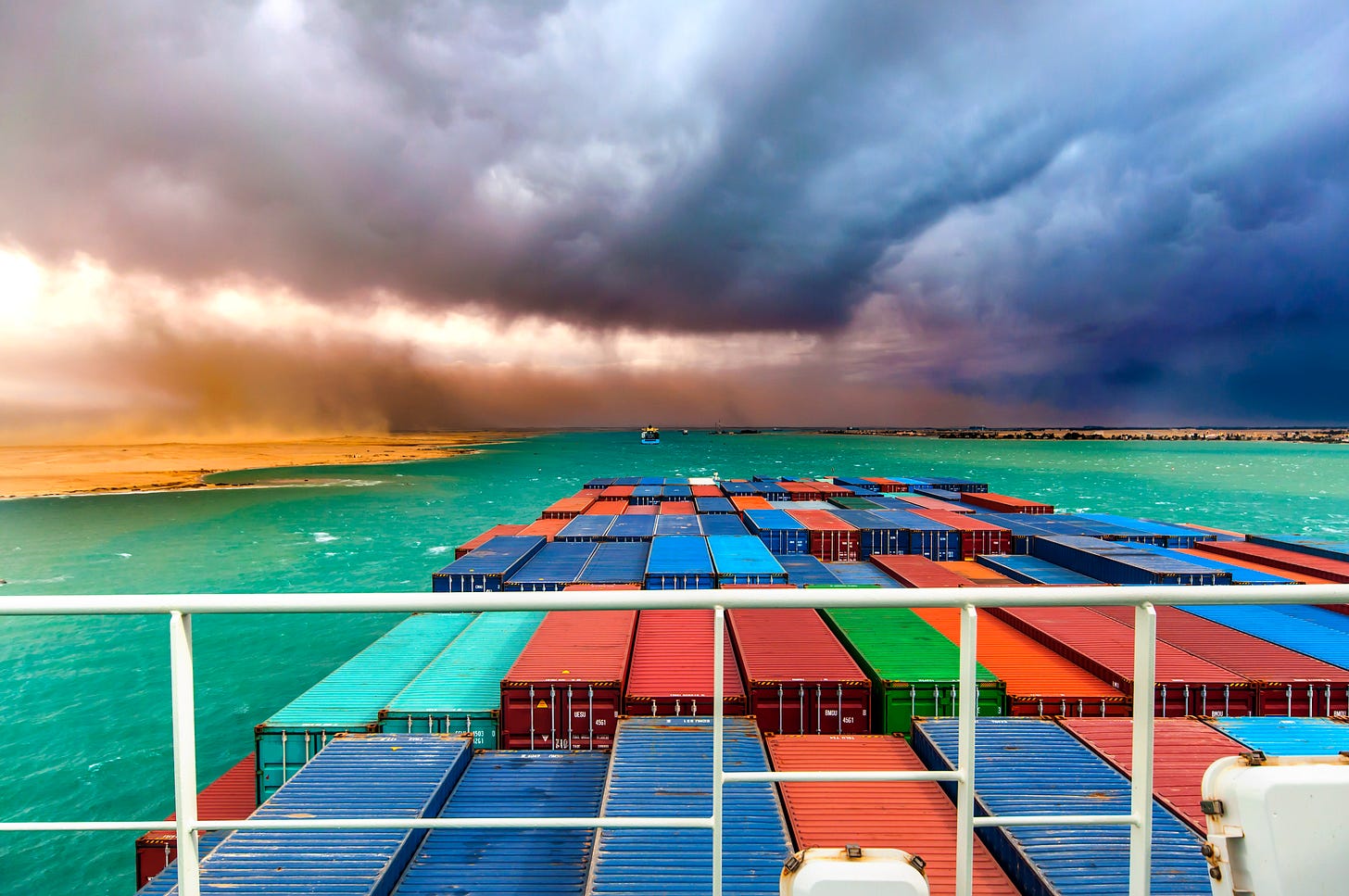Emerging Markets Daily - Sept 28
Saudi Economy Rebounds, Kenya Airways and South African Airways Join Hands, Energy Prices Rising, Malaysia Set to Re-Open Economy, Shipping's Latest Shock
The Top 5 Stories Shaping Emerging Markets from Global Media - Sept 28
Saudi Arabia Economy to Rebound in 2021 On Oil Price Rally
S&P Global Platt’s
“Saudi Arabia's economy, the Arab world's largest, will return to growth in 2021, thanks to higher oil prices, continued relaxation of OPEC+ cuts and the rollout of COVID-19 vaccines, S&P Global Ratings said in a Sept. 27 report.”
“S&P Global Ratings, which has affirmed the country's A-/Stable/A-2 sovereign rating, said the monthly relaxation of OPEC+ quotas will prop up Saudi Arabia's oil sector and economy in 2021 and 2022. Saudi Arabi's economy will swing to growth in 2021 after shrinking 4.1% in 2020, the worst contraction since 1987. The growth rate in 2021-2024 will average 2.4%, S&P Global Ratings said.”
"‘In 2021, the country's economy has begun to rebound, as the global economy emerges from the pandemic and oil prices have improved, although these trends remain partially counterbalanced by Saudi Arabia and OPEC constraining oil production,’ S&P Global Ratings said in the report.”
“S&P Global Ratings assumes an average ICE Brent price of $65/b for 2021, falling to $60/b in 2022, and $55/b from 2023. Saudi Arabia is part of the 23-member OPEC+ alliance which started relaxing cuts by 400,000 b/d each month from August until December this year. OPEC+ ministers, who are convening monthly, are set to meet virtually on Oct. 4.” S&P Global Platt’s reports.
Kenya Airways and South African Airways Partner to Form Pan-African Airline
The East African
“Troubled Kenya Airways (KQ) and South African Airways (SAA) have partnered to help shore up their battered revenues. They signed a memorandum of co-operation on Tuesday aimed at forming a pan-African airline.”
“Kenya Airways CEO Allan Kilavuka said in a statement Tuesday that the mutual co-operation between the two struggling carriers would help in turning around their fortunes.”
“‘The future of aviation and its long-term sustenance is hinged on co-operation. KQ and SAA collaboration will enhance customer benefits by availing a larger combined passenger and Cargo network, fostering the exchange of expertise, innovation, best practice, and adopting home-grown organic solutions to technical and operational challenges,’’ said Mr Kilavuka.”
“He said the loss making national carrier, which is a subject of state takeover, remains committed to its financial turnaround strategy with pursuit of partnerships being one of its core strategic pillars.”
“SAA’s interim Chief Executive Thomas Kgokolo said the cooperation between the two airlines, which includes demand recovery and other cost containment strategies, will aid recovery of both carriers in an increasingly competitive African airline environment.” James Anyanzwa reports.
Coal, Carbon, Europe Gas Hit Record Highs, as Oil Rises
Financial Times
“Coal, carbon and European gas prices have all hit record highs as crude oil pushed above $80 a barrel in the clearest signs yet that the world is heading into an energy crunch likely to weigh on economic growth.”
“Brent, the international benchmark, rose as much as 0.9 per cent to $80.22 a barrel on Tuesday morning, hitting a three-year high for the second consecutive day and bringing crude’s gains for the year to date to almost 55 per cent.”
“European benchmark gas prices for delivery next month climbed another 10 per cent, meaning costs have doubled since the middle of August, while the price of offsetting carbon emissions — through contracts known as offsets — continued to rise, pushing further past €65 a tonne in intraday trading on Tuesday.”
“‘We’re looking at not just the UK and Europe but a potential global energy crisis coming into the winter,’ said Robert Rennie, global head of market strategy at Westpac.”
“US natural gas prices surged above $6 per million British thermal units, their highest price in seven years, before retreating slightly in volatile morning trading in the US.”
“Analysts said the soaring price — with the front-month contract up almost 200 per cent in a year — was the result of less drilling by US shale producers, supply disruption following hurricanes in the Gulf of Mexico and fast-rising demand, which left stored natural gas stocks well below the five-year average.”
“‘[The price] could go much higher if the weather is as cool this winter as some people predict,’ said Andrew Gillick at energy consultancy Enverus.” The FT reports.
Malaysia Set to Reopen Economy As Adult Vaccination Levels Near 90%
Nikkei Asia
“Malaysia plans to reopen more of its economy in October, banking on a rising vaccination rate and falling infection numbers amid lingering concerns that COVID-19 could surge again.”
“The government intends to allow interstate travel, as well as reopenings of theme parks and entertainment venues, once 90% of adults have received two shots -- a threshold expected to be reached by next week. About 84% of adults had been fully vaccinated as of Monday, with over 150,000 receiving their second doses daily.”
“Health Minister Khairy Jamaluddin recently assured parliament that allowing interstate travel would not result in a spike in new cases, as until now the problem has been mainly large gatherings. Khairy also said the 90% vaccination rate among adults represents 60% of the overall population, thus reducing the risks.”
“Beyond the reopening, the government aims to spur growth to an average of 4.5% to 5.5% for the years 2021 to 2025 and turn Malaysia into a high-income economy, Prime Minister Ismail Sabri Yaakob announced on Monday. His "Malaysia Plan" calls for pouring 400 billion ringgit ($95.5 billion) into development initiatives during the period.” P Prem Kumar reports.
Container Shipping’s Latest Shock: China Power Shortages
gCaptain
“Factories in at least ten Chinese provinces have either cut output or closed temporarily this month, after government-imposed power cuts to curb carbon emissions.”
“By Friday, at least 10 publicly listed companies told the Shanghai and Shenzhen stock exchanges their factory output had been hit by the power cuts, and their 2021 earnings could be adversely affected.”
“The cuts followed China’s economic planning agency, the National Development and Reform Commission, released a ‘dual-control’ plan to restrict energy-intensive activities and consumption. The plan commanded provincial governments to ration electricity consumption to control emissions in line with President Xi Jinping’s target for carbon emissions to peak by 2030, and to achieve carbon-neutrality by 2060.”
“Affected provinces include Jiangsu, Guangdong and Zhejiang, which are among the most industrialised in China, their factories producing steel products, plastics, home appliances, chemicals and textiles. All three provinces had received ‘red ratings’ for missing consumption targets.”
“The provinces are also home to China’s busiest ports, Ningbo, Guangzhou, Nansha, Yantian and Shekou. And Jiangsu province lies along the Yangtze River Delta and its container exports are usually processed by Shanghai or Ningbo.”
“As this is the peak season for container shipments to US and European retailers, the new moves could exacerbate delays in receiving shipments at the ports, especially when the power cuts last beyond the end of September. And congestion on the US west coast has held up shipments, with some 70 ships waiting outside Los Angeles and Long Beach due to surging imports and insufficient trucking and land-based logistics." Martina Li reports.
“There is nothing permanent, except change.” - Heraclitus




